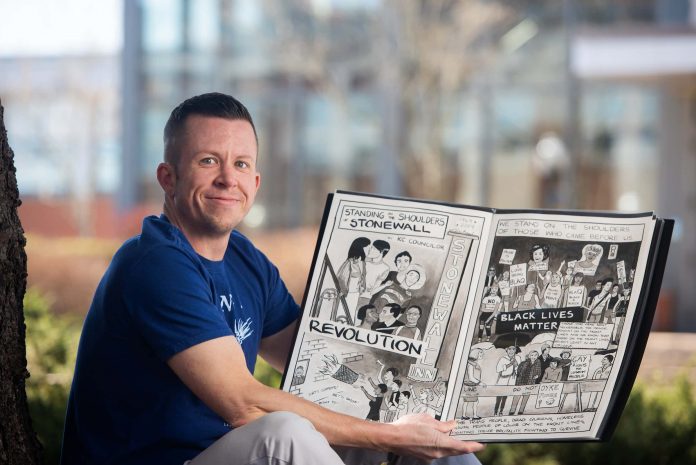Professor Finds Unity in Art and Vulnerability
There were signs that KC Councilor, assistant professor of Communications at Southern, “was queer growing up,” but it wasn’t until Councilor was a 33-year-old graduate student that he began to understand the complexities of his true identity. While taking a comics course under cartoonist and author Lynda Barry at the University of Wisconsin – Madison, Councilor had the life-changing experience of using comics as a way to own his journey. Now, as an openly trans adult and the cartoonist behind the memoir Between You and Me: Transitional Comics, Councilor hopes his story encourages other trans people to live freely.
In his thirties Councilor says, “I was not in a great place with my mental health. I’d started grad school, and I felt like I couldn’t spend the rest of my life in small rooms talking about rhetoric. I wanted to feel relevant, to feel like life was meaningful. I was closed off and cold – winters in Wisconsin are so long and dark. I can see myself, without Lynda Barry’s class, and I imagine I might not have finished school.”
Instead, because of Barry’s course, Councilor’s entire world changed.
“I saw, here’s this famous cartoonist, and I had read her work and a friend had taken her class and I was jealous,” he says. “But I don’t draw. I never thought of myself as an artist. I had to apply to be in the class, and I was nervous. Lynda is a movement within comics as a teacher. Her approach is totally unique.”
In his autobiographical comics, Councilor began to play with gender and identity concepts.
“We chose character names, and my first name was Mighty Mouse, then Chef Boyardee,” he says. “[In comics] there’s space to try things on and see things in a different way. Also, there was no critique and that would have changed things drastically. It was freeing.”
The more Councilor drew, the more he began to recognize his own gender identity — and to visually lay claim to his journey.
“I didn’t just go from being a blonde woman to a man overnight. I identified as a butch lesbian for 20 years. I just transitioned hormonally five years ago. It was through drawing [in Lynda’s class] I came to understand I was trans. I know my drawing hand led me to transition. [Lynda] made me feel seen as a man and that was validating.”
Most of the work Councilor crafted in Barry’s classes over the course of three or four years appears in his memoir Between You and Me: Transitional Comics (Drawbridge Press, 2017), a book he says helped him own his unique experiences of going from identifying as a woman to identifying as a male and “not just being subjected to them.” He also has contributed comics to anthologies such as Menopause: A Comic Treatment and made comics for academic journals such as Drawing the Body In: A Comic Essay on Trans Mobility and Materiality.
Art, he says, can serve as an important unifier.
“[My partner Cate and I] have friends who are medical doctors, and I still think of them as intimidating because of their PhDs but with the field of graphic medicine, which is growing and fascinating, it’s a way for all of us to share work and meet online for drawing, and there are doctors who are published comics now. Art can unite.”
While the dialogue about trans acceptance has become broader, more informed, and even more inclusive, Councilor points out that the experiences of the trans community are diverse. Elliot Page, for instance, made headlines as the first trans man to appear on the cover of Time magazine this spring and was commended for using his voice to advocate for trans representation, but Councilor cautions: Page’s journey is not always true for everyone.
“Elliot Page is the starter narrative for trans people, and in some ways that’s good because it helps explain it. But there are other narratives. It is a unique and interesting experience to be trans. No one’s journey is wrong and that makes me want to make comics about it and also to be visible for students. It feels like a responsibility to be out because I can, and I have a platform.”
One of the ways he supports trans kids is by supporting their parents.
“I say yes to any invites to speak,” he says. “Cate and I visit different support groups for parents [of trans children]. Parents are looking for definitive answers and so much depends on people’s own experiences. My book hopefully has been helpful to different populations in different ways.” Between teaching, speaking, and co-hosting the Real Talk podcast with Southern student activist Jamil Harp, Councilor hasn’t had as much time for drawing, but he’s hoping that will change.
“I do have another book in me,” he says. “I want to put together a book that’s sort of a continuation of Between You and Me. I experience things through the lens of comics. During Covid, through August 2020 I drew a daily comic and it marked what was happening in the world. Sometimes gender/trans stuff comes up and sometimes not at all, but a daily process is a good thing to do.”
As a teacher, being accessible and authentic takes top priority, and there’s evidence – in the way of comics, in fact – that Councilor is leaving an important mark. One student noted in an online comic testimonial that “Drawing together makes us more vulnerable and more closely related.” The idea of vulnerability is one he’s covered in his Real Talk podcast and, like art, he sees it as a force to bring people together.
“People say to me, ‘Wow, how do you share vulnerability?’ But once you go through the process of creating the comic, it’s out there and you’ve birthed it. I try to destigmatize trans-ness. I try to get everyone drawing. I hope I can help people have their ‘Lynda moment.’”


